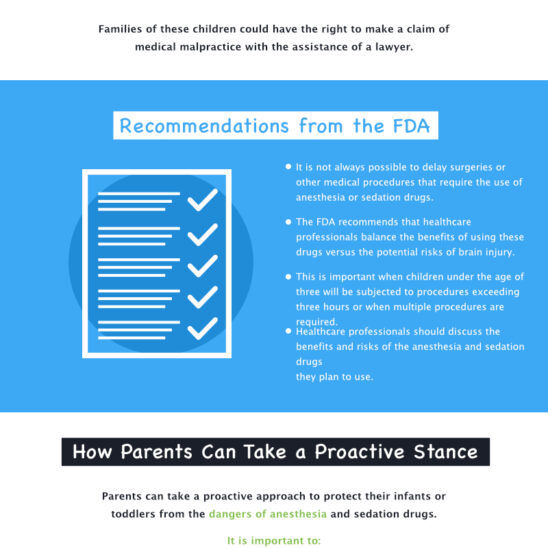The Food and Drug Administration (FDA) has issued a warning on the use of general anesthetics and sedation drugs during procedures or surgeries on pregnant women and children under the age of three. Lengthy or repeated use could interfere with the development of young children’s brains. Affected children could require specialized medical care and special accommodations for the rest of their lives. Families of these children could have the right to make a claim of medical malpractice with the assistance of a lawyer.
(Article continues below infographic)
______
Effects of General Anesthesia on Young Children
Anesthetics have been shown to have neurotoxic effects on the developing brain. A study conducted by the University of Iowa, Department of Anesthesia studied children between the ages of 12 – 15 years who had anesthesia and surgery as infants. MRIs showed that these children had a lower volume of whole brain white matter when compared to control subjects in the study. Exposed children also experienced a reduction in regional white matter volumes and integrity.
Recommendations from the FDA
It is not always possible to delay surgeries or other medical procedures that require the use of anesthesia or sedation drugs. The FDA recommends that healthcare professionals balance the benefits of using these drugs versus the potential risks of brain injury. This is important when children under the age of three will be subjected to procedures exceeding three hours or when multiple procedures are required. Healthcare professionals should discuss the benefits and risks of the anesthesia and sedation drugs they plan to use.
How Parents Can Take a Proactive Stance
Parents can take a proactive approach to protect their infants or toddlers from the dangers of anesthesia and sedation drugs. It is important to:
- Discuss the potential risks of the medications with the child’s doctors
- Understand the effects the medication could have on the child’s brain development
- Ask whether the surgery or procedure could be delayed without jeopardizing the child’s comfort and health until the child is older
Pregnant women should also discuss the risks of surgery or procedures before their child is born to prevent exposure to developing fetuses.
After surgeries, it is advised that parents and caregivers be alert to signs of changes in their children’s behavior or learning abilities. The FDA urges all health care professionals, parents, and caregivers to report side effects of anesthetic and sedation drugs to the FDA MedWatch.

